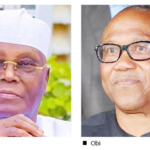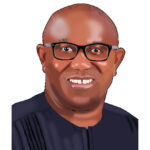In the 1960s, I had a dual opportunity. First, was to live with a Mallam Mijinyawa a Qur’an teacher, to learn the glorious book. Second, was to attend a primary school as I was enrolled in the Native Authority Primary School. Both went on simultaneously in Dekina. At that time my parents lived in Idah as my dad was a Native Authority councillor.
To meet my primary school needs, Nelson, an Ibo man that ran a provisions store was given a standing order to always supply me whatever I needed for my primary school. Then, I saw that Nelson’s shop was within the cluster of other Ibo people’s shops. I also observed that no one of the indigenous people, the Igala people in Dekina was in the same trade with the Ibo.
When the civil war broke out, the Ibo people including Nelson, left. This left an opportunity for the indigenous people to venture into trades or economic activities that were hitherto exclusive domains of the Ibo. Yes, the indigenous people had a field day buying and selling and making money throughout the civil war period.
When the war ended, virtually all Ibo that left Dekina returned, including Nelson. This is as more survivors of war returned to Dekina to re-organise their livelihoods. In no time, the Ibo took over their trades as the indigenous people went bankrupt and were forced out of the trades. With the Ibo trade strategies, the indigenous people were edged out. The domineering exclusive trades and professions tendencies of the Ibo are still visible with us today.
Ex-police officers protest in Bauchi, seek exit from PenCom
Speakership: Why I endorsed Abbas against Borno aspirant – Zulum
Some time ago, a young Ibo man came to my hotel room and I murmured to him a word of appreciation in the Ibo language. He acknowledged and I assured him that really I should have been fluent except that the Ibo will not allow that.
There is no community across the length and breadth of Nigeria that the Ibo are not found and are engaged in one economic activity or the other. This notwithstanding, the Ibo remain the metaphorical oil, never mixing with water. The Ibo have refused integration with the communities in which they live. Invariably, the Ibo have not socioeconomically mingled with the larger community not to talk of the immediate indigenous people.
For instance apprenticeship, a common feature of Ibo trades is limited to fellow Ibo people from families, clans or other Ibo communities. More so, with colonies of shops, enclaves of Ibo residential areas, over-protected trade guilds and refusal to partner and train except fellow Ibo, the Ibo have denied other Nigerians the opportunity to mingle and understand them.
The fact of the matter is that the Ibo have not allowed other Nigerians to penetrate their residential and trade colonies. This includes the various trades the Ibo carry out in various cities, towns and villages.
The onus is not on other Nigerians to force a co-habitation. The Ibo must open up to other Nigerians. Co-habitation can only result from effective mingling. The inability of the Ibo to relate to other Nigerians is further consolidated by the tendency of the Ibo to take political decisions that are tainted with ethnic colouration.
The inability of the Ibo to allow others to mingle with them is the dilemma of Peter Obi’s bid to be president of Nigeria. How do you lead people you don’t know or who do not know you? Except for group identity and exclusive domination of certain socioeconomic activities, no one may claim to know the idiosyncrasies of the people. Possibly due to poor knowledge of politicians of the North, Peter Obi chose a fine investor for a running mate. I hope Obi now understands why his running mate lost his polling booth to another party.
People did not vote for Peter Obi per se. With or without shishi (three Pence or five Kobo), Peter Obi would not have harvested this much votes to make him a second runner-up. Yes, every vote for the Labour Party was a protest vote against the Muslim-Muslim ticket of the All Progressives Congress or carryover from the EndSARS movement. The block votes from South East for Labour Party were both protest and hope votes – the hope that a south-eastern person will become president!
Much of the LP votes outside the South East were recorded in more or less Christian communities. This is so because in big and small churches there was a vehement campaign against Muslim-Muslim ticket. This is in the ignorance that religion is far from leaders’ ability to deliver development.
The pastors spent far more good time on political education which turned out stronger than Peter Obi’s extremely weak political structure. Certainly, Labour Party had no full compliments of all political contestants across all states of the federation.
Like it is said that there is no smoke without fire. Whether there was “Yes Daddy” or not, a religious war was somehow fought from the pulpits of various churches. This has left Peter Obi under the illusion that people voted for him. The division of the electorate along lines cannot be a platform for winning an election. This is so as opponents also developed strategies to debunk the fallacy of the Muslim-Muslim ticket oozing out from the pulpits.
From the post-election activities and utterances, it is obvious that Peter Obi could not have been a patriotic leader. What leader will scamper to leaders of other countries and multilateral organisations to seek redress on a matter of his country? I am tempted to think that the Labour Party will compromise our sovereignty at the slightest opportunity. This is made worse by the seeming composition of pro-Labour Party protesters in other countries. Many of the protesters are of South East, the Ibo territory. Whoever thinks that President Biden, or the United Nations among others, will solve our internal problems must be extremely naive. Whether you believe in our institutions or not, we govern ourselves as a people with shared fate.
All the same, I congratulate Peter Obi and all the pastors that spoke against the Muslim-Muslim ticket for putting the Labour Party on the national political map. But that is not enough to win a presidential election. Nigerians want to live and understand who governs them. The long-established culture of isolation in residential areas, colonies of shops and exclusive trade does not build trust, mutual understanding and coexistence.
The Ibo need to cultivate trust, mutual understanding and sustainable co-habitation. To do this, Ibo people must open up their exclusive system and abandon it as a sacrifice for Nigeria. My Ibo people, the choices are yours to integrate or not to integrate.
Yunusa is the Executive Director, Socioeconomic and Environment Advocacy Centre, Zaria

 Join Daily Trust WhatsApp Community For Quick Access To News and Happenings Around You.
Join Daily Trust WhatsApp Community For Quick Access To News and Happenings Around You.


